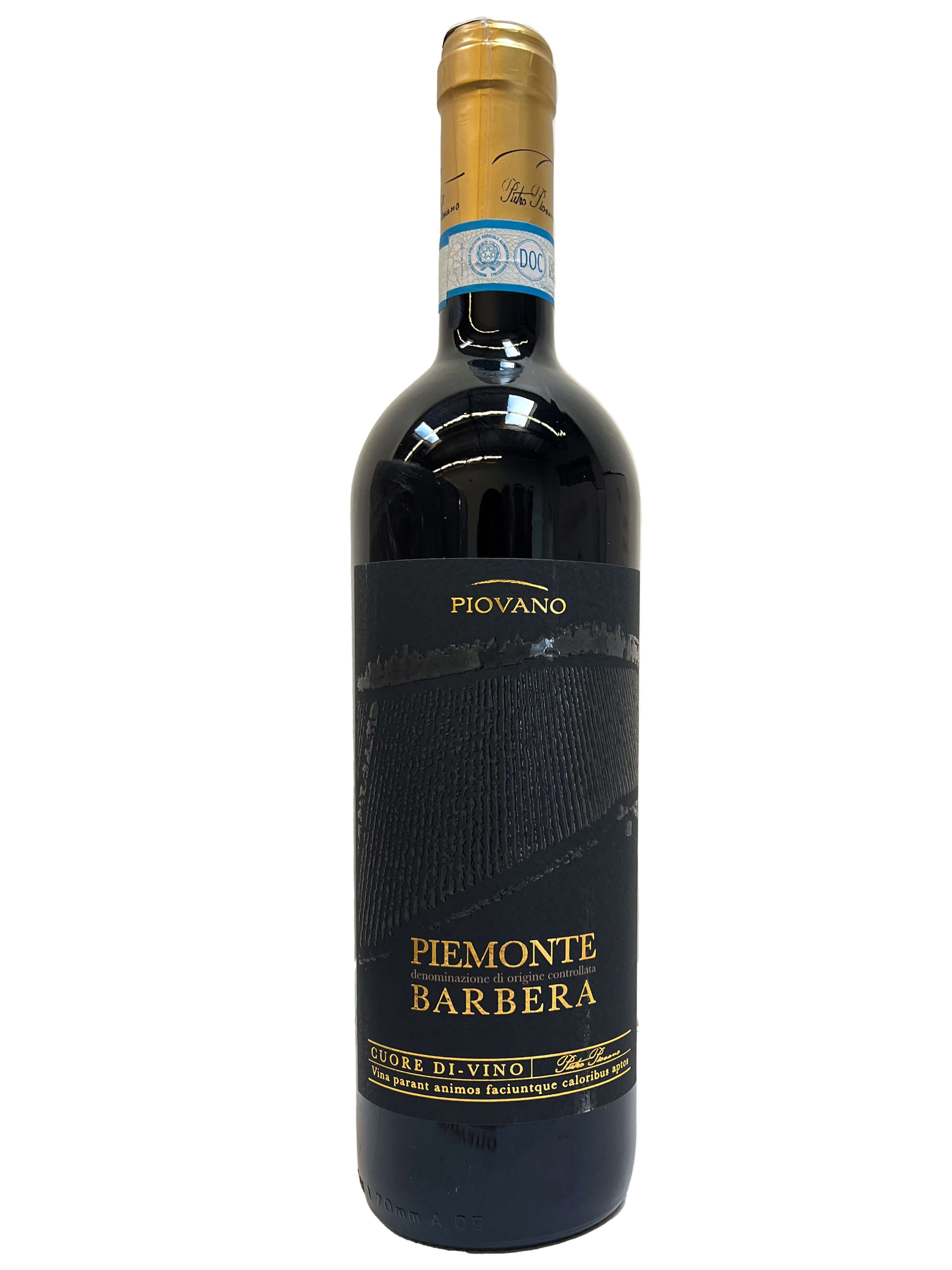This Family's Wine Prepares Our Souls for Passion
Here are Pietro Piovano and his wife Olfa at their family Italian winery in Piedmont.
There is more to the Langhe in Northern Italy than Barolo vineyards. Go past the tourists’ parked cars and keep driving over the hill and down towards Mondovì, you will find, tucked in on the ‘backside’ of the Barolo hills, the hamlet of Bastia Mondovi, the home of the Piovano family.
The Piovanos have been growing and crafting Italian wine true to what they feel in their hearts is arguably the most prestigious wine region in Italy, Piedmont Italy. It is in these small, off the beaten track places that some amazing small production wines can be found, and the Piovano family are no exception to this rule, crafting natural wines for generations. Let’s meet them (and their amazing wine Barbera style)!
Meet the Piovano’s
The Piovano family has lived in Bastia Mondovi for generations, living first in the hills above the small Piemontese village. Then in the 1940s they made their official move to the center of the village, which is now the family home that also houses the winery. You can tell that family history is important to them because while entering the winery the first thing one sees are rows of black and white family photos, documenting trips to California to play in competitions of pallapugno (a team sport local and well played in the Piedmont and Liguria), to family photos skiing on old-fashioned wooden skis.
Display of old family photos in the entry of the Piovano winery, with portraits of Maria and Luigi prominent in the top left corner.
In 1945, as war raged in Europe, the ‘father’ of the family at the time, Luigi Piovano, went to fight on the eastern fronts as an Alpino, a branch of Italian soldiers from the mountainous regions of Italy recognizable for their distinctive green hats with a black feather. During this time, his wife Maria (maiden name Chionetti), carried the family forward. Upon Luigi’s return, he founded the winery in 1946, and forming the beginning of the Piovano family winery, even if they had been making wine for personal consumption for much longer.
As time went on, and Luigi and Maria’s children grew, all helped in the winery, although only one really showed interest in one day taking the reins of the family winery. That son was Pietro, who still runs the winery today, with the help of his wife, Olfa, who we will get to know in just a moment. In 1978 Luigi’s health caused him to step back as the central figure of the winery, and Pietro stepped up and start crafting wine in his vision.
The Piovano family winery is in Bastia Mondovi, the southern part of the Langhe, in Piedmont, Italy.
Pietro’s life changed once again in 2005 when he met Olfa Hadef, who would eventually become his wife. Born in Tunisia, Olfa earned her degree in International Law, and then moved to Italy to work as an international business consultant, which is is how she and Pietro met: interested in growing his business overseas, Pietro contacted Olfa after seeing an ad for her company. The rest, as they say, is history.
Under Pietro’s hand, and with the help of Olfa, the Italian winery has continued, keeping their old family home and winery in Bastia Mondovi, with four vineyards that they now care for and farm. Pietro and Olfa have become a dynamic duo, working together in the winery and business. While Olfa’s original career path and studies may not have been directed towards wine, upon falling in love with Pietro, she has thrown herself passionately into the industry. Handling the winery’s business aspects at first, Olfa now eagerly works alongside her husband in the intricacies of farming and winemaking. While they hope that someday their three children will follow in their footsteps with the winery, at the moment they are content continuing the farm and crafting their wines themselves. And how do they do that?
Piovano’s Cuore Di-Vino Winemaking
Piovano’s vineyards in the southern hills of the Langhe Italy.
‘Cuore di vino’ in Italian translates to ‘heart of wine’, and ‘cuore divino’ translates to ‘divine heart’. This little play on words, cuore di-vino, combined with the latin phrase, vina parant animos faciuntque caloribus aptos that translates to ‘wine prepares our souls for passion’ are the mottos adopted by the Piovanos. They allow us to form an image of the philosophy behind Piovanos’ winemaking style, which is that wine is more than ‘just a drink:’ it is rather a foundation for love, passion, and life. And why wouldn’t one take the utmost care and thought when crafting such a special beverage?
That is just what they do. Searching to make every wine as naturally as possible, with as little poking as prodding as they must, they allow their vines and wines to express the love, passion, and nature of the terrior. To make their still wines, they use only native yeast fermentation, so to avoid steering their wines away from their natural flavors. They have made a significant commitment as well to organic wine, with one vineyard fully certified organic. The other vineyards are farmed organically, and just need a little more time to produce certified organic wine. While they farm dolcetto grapes, barbera grapes, and nebbiolo grapes, today we look at an outlier wine: the Piovano Piemonte Barbera.
Here, you need to forget your typical assumptions of Barbera wines or Barbera d Alba. What we find here under the black and gold label, is a testament to what the barbera wine grape can do when crafted with passion. Starting off with the basics, this natural wine comes from an organically farmed vineyard, made with no added sulfites, and with native yeast fermentation and unfiltered: in other words a 00 wine, meaning nothing added, nothing removed, it is what it is.
It is a tribute to a Barbera grape wine. You see, this wine did not take the normal path of a Barbera wine. In 2017, Pietro recognized that the vintage showed unusual promise for his Barbera. With wonderfully ripe grapes, he decided to try and experiment: what happens when you let a Barbera wine do it’s own thing, evolve naturally and let it age longer?
So, he let the Piovano Piemonte Barbera spend two years aging in stainless steel, then moved it over into small old oak barrels for another three years before bottling and letting it rest. What resulted was a Barbera wine we just had to import: a full bodied red wine with great red fruit and structure, that is also a red wine that is easy to drink. While Barbera wines can be known for their high acidity, after spending five years aging, this oaked wine has an acidity that is mellowed out and tamed. But, amazingly, Pietro kept it fresh, fruity, and complex.
You can smell the intense bouquet a mile away, with vanilla soaked cherries filling your nose… but really, every sniff is a new scent, with an amazing array of spices coming to mind as well. Then sipping is where the magic happens: first full on fruit, then it coats your mouth in a delicious, velvety richness. Thanks to the remaining acidity and tannins, it is well balanced and leaves you wanting for more.
At times, you almost want to chew the wine, to savor the intense complexity even more. We know Barbera as a food friendly grape, and you can certainly enjoy this wine with any number of dishes, but that full-bodied richness can be enjoyed on its own too, allowing you to savor every last drop of the velvety-goodness that the Piovano family have poured into this Piemonte Barbera.
How to Taste Piovano Wines for Yourself
Now is the time for a test, but of the best kind: a taste test of the Piovano Piemonte Barbera. You can find it in our VeroShop, ready for delivery to your door. And while you wait for this wine to arrive, make sure you are signed up for the Vero Newsletter to keep up to date on our latest releases, articles, and news!
As well, as a reminder, we sell small production wines and organic EVOO to both businesses and consumers across the US:
We are enlarging our network of distributors around the country. Reach out to us if you are interested in distributing our wines.
We sell to wine stores and restaurants in certain states - contact us if you would like more info.
We do corporate gifts and sommelier guided wine tastings. Email us and we’ll tailor unique and sustainable corporate gift ideas.
If our farm crafted wines and olive oils are not in your local shop or restaurant buy wine online here where we ship to most states.
We also have an award winning wine club for true wine explorers seeking to continually discover unique, sustainable and authentic small production wines they never had.





